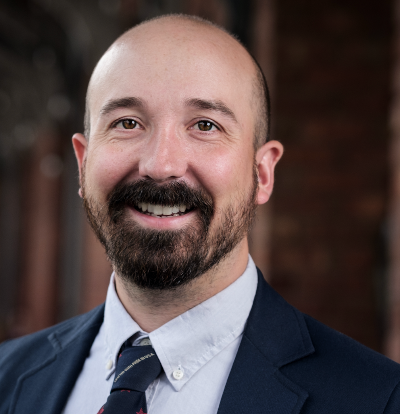
Will Eley, Green Jobs Program Manager at Piedmont Environmental Alliance, interviewing Adrian Smith of Robert Rust Foods.
WE: First off, Adrian, congratulations on Robert Rust Foods’ successes and two-year anniversary. Your food and your business principles are so valuable to our community. And PEA’s Green Business Network is especially grateful for your leadership. So, thank you.
This anniversary theme–another lap around the sun kinda thing– has me thinking about your commitments to a circular, sustainable economy, namely through your zero waste practices and protocols. It was very clear to me when we first sat down to chat that zero waste is central to everything you do. Tell us more about where and when that sparked for you.
AS: Zero Food Waste is a goal we work towards every day, and the underlying values that led us to Zero Food Waste are expressed throughout the company. We reach Zero Food Waste by composting all food scraps from cooking and by donating all leftover food from events like the Cobblestone Farmers Market. That was relatively straightforward - we just had to buy a food safe bucket for our scraps and develop relationships with a couple of food pantries who we donate to. Luckily, I’ve been an avid composter for years, so I was glad to have additional food scraps to add to my at-home compost.
Developing the knowledge base and the values that led me to establish a zero food waste goal has been a lifelong pursuit. A few important reasons we went this route are: (1) agriculture contributes to climate change, so we shouldn’t waste our food, (2) Winston-Salem has high occurrence of food deserts and low economic mobility, so our neighbors need our support, and (3) for Robert Rust Foods, tax incentives and brand building are positive impacts of donating leftover food.
Winston’s landfill consists of ~30% food waste, and will be full by 2040. Where will the next landfill be located? I’d love to see Zero Food Waste adopted city-wide through municipal composting and comprehensive donation programs for grocery stores and restaurants.
WE: I love that you unpacked a bottom-up-middle-out-top-down approach to solving structural issues like food waste, and how these waste volumes put significant, and expensive, stress on city infrastructure.
What is next for you and Robert Rust Foods? And beyond food waste reduction, what are some additional hopes you have for other local businesses and your fellow Green Business Network members? Say, some environmental blindspots you have overcome that you hope others will be mindful of.
AS: I think of sustainability as having three legs: environmental, social, and economic. As I plan for the growth of Robert Rust Foods, I try to find ways to uplift my community, and establish the company as a trusted brand, through all three sustainability perspectives. A few examples include: we treat our employees with respect and pay living wages; we prioritize purchasing ingredients and services from local suppliers (especially Black and Brown-owned businesses); we create healthy food and feature lots of vegetarian and vegan options.
I find that making business decisions with sustainability as our North Star leads to a lot of positive externalities. Happy employees stay longer and engage more with their work. Buying local supports our neighbors and leads to more jobs. Our recipe choices lower carbon emissions (we don’t have any beef products, for example), while contributing to healthier diets for our customers. Over time, Robert Rust Foods will purchase more locally grown/made products, like the sausage we buy from Pine Trough Branch Farm or the tempeh we buy from By the Brook Ferments.
I hope that other business owners might use this sustainability framework to help create their own strategies. It’s as simple as asking a few questions while you draft your plans.
- Environmental: Does this plan create a lot of waste, or use a lot of energy/water? Will this plan affect nearby forests, soils, waterways, or air?
- Social: How will this plan affect me, my family, my employees, and my community?
- Economic: How will this plan affect our bottom line, even when accounting for environmental or social costs?
Finally, I’d encourage business owners (and community members at large) to think of sustainability as not just risk mitigation, but as opportunity. We can improve the health and happiness of our community by making well-informed and creative decisions about our businesses.
WE: Adrian, PEA can’t thank you enough for sharing your time and insights with us; and for reiterating that sustainability is all about opportunity, not sacrifice or inconvenicne. PEA couldn't agree more. We are excited to continue carrying this sustainability flag with you.
Before we go, remind us again where we can find Robert Rust Foods products?
AS: Thank you, Will! And if any PEA readers want to chat more, please feel free to reach out to me. You can currently find me at Cobblestone Farmers Market every Saturday, or at the following retail locations:
Winston-Salem: Acadia Foods abd Bluie's Market
King: Dragonfly Market
Greensboro: Deep Roots Market,
Durham: Durham Coop Market
Raleigh: Papa Spuds, Weaver St. Market
Hillsborough: Weaver St. Market
Carrboro: Weaver St. Market
Chapel Hill: Weaver St. Market
Pittsboro: Chatham Marketplace Co-op Grocery & Cafe
Morganton: Food Matters Market & Cafe
Franklin: Yonder Market
Duck: Shane's Family Market
Elizabeth City: My Corner Butcher
Asheville: Mother Earth Food
adrian.smith@robertrustfoods.com
www.robertrustfoods.com